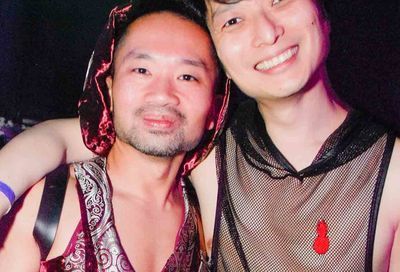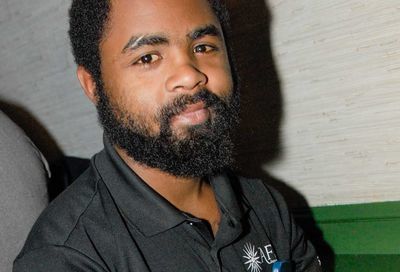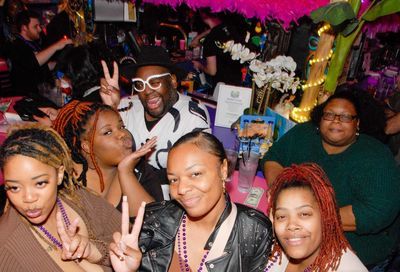The Lingering Whiff of Anti-Semitism
Learning Curve
The U.S. Holocaust Memorial Museum just concluded its powerful, four-month exhibit on Nazi persecution of homosexuals. And now, with both Passover and Hitler’s birthday landing on the same weekend this year, I’m still sorting through my feelings about Jewish lesbian survival. It’s a tough time to be Jewish, caught between the anti-Zionism of the Muslim world and the cool disdain of the Christian right. Close to home, throughout this entire past year, the big peace demonstrations here in Washington, D.C. have included intense criticism of Israel. Attending these rallies, I have experienced the distress of being a peace-activist Jew amid a sea of harshly anti-Jewish placards.
The peace movement owes much of its momentum to mainstream Jewish liberals, aging Jewish lefties, and, certainly, Jewish lesbians. We all share an outraged opposition to Israel’s abuses of the Palestinian people, to any ethnic persecution in “our” name. Yet for the first time in almost 35 years of attending peace marches (as a kid with my parents in the late 1960s, then with gay activist friends, and now with my own college students), I’ve lived with the odd feeling that now I represent the enemy, the bad tribe.
|
Though I personally oppose Ariel Sharon and the policies of the Israeli military, I take pride in being visible as a Jewish dyke minority in Christian America, and so I wear a Jewish star. And, unfortunately, far too many signs and slogans at the A.N.S.W.E.R. peace marches blur this all-important distinction between Judaism and the Israeli army, presenting instead the stark equation of killers = occupiers = Jews. I’ve seen too many protestors carry signs with a Nazi swastika stamped on the Star of David. And, last spring, an Israeli flag was set on fire in front of my apartment building on Connecticut Avenue, gobs of flaming cloth perfuming the air with a sickening reminder of historic Jew-hatred, while a group of masked young men and women cheered, danced, drummed, stomped on the blue star, then sang out: “God is great.”
As Jewish lesbian writer Thyme Siegel once said in a workshop, “It’s one thing to condemn Zionism and Israel if you also care about the future of the Jewish people; quite another if you don’t give a damn about Jewish survival. ” In my own words: if you want the Jews out of Israel, you’d better prove you’re committed to welcoming a Jewish presence everywhere else, because the torching or desecration of Jewish symbols — gravestones, synagogues, schools — in places far from Jerusalem are exactly the intimidation tactics provoking Jews to embrace Zionism. Watching young, white American hipsters, who apparently lack any understanding of public anti-Semitism in history, stomp up and down on a Star of David and embrace that ritual as a cool new cause is what makes us “old” Jewish radicals say to each other, “Oy — this is a peace march?”
Folks, it doesn’t have to be like this. And I’m painfully aware of two things. First, extremists and jerks who favor violence shouldn’t represent any movement: but they make great media hype, can attract or repel potential followers, and have enormous power to erode the hard-won credibility of more moderate, bridge-building leaders. Second, by taking the extremists’ words so personally, I learn how many men feel when they show up to support the radical feminist rallies I love, or how my mom feels as the proud mother of a gay daughter when she experiences gratuitous straight-bashing humor at any Pride event. Symbolizing “the enemy,” when the enemy is of course not you, but systematic discrimination privileging certain groups over others, is an unwelcome responsibility for any individual.
But back to those blurred distinctions: At peace marches in D.C. I’ve seen signs and banners proclaiming “Israelis drink blood,” “The U.S. government is a Jewish state,” and the ever-popular “All Zionism is racism.” Why is this rhetoric not helpful?
Because it recycles some of the most ancient tactics of Jew-hating which predate the modern State of Israel by centuries: the blood libel (that Jews kill children to make matzo, a popular rallying cry at medieval pogroms); that Jews secretly control all world government (popularized in the Protocols of the Elders of Zion, a fabricated text still sold by both white power and black power groups); and that all Israelis are white Europeans deliberately eliminating people of color, which renders invisible the huge percentage of non-Western Israelis and Jews from Morocco, Iraq, India, Ethiopia, Syria, Turkey — Jews previously ghettoized and oppressed in those lands.
The positioning of these Mizrachi Jews against their Arab neighbors, when many have roots more in Arab culture than in Ashkenazi Judaism, is far more about religion than race. As a political strategy, though, “Zionism is racism” is a slogan that allows questionable tactics among the Left. At one lesbian conference, I observed a multiracial group of women interrupt a Jewish lesbian prayer service, one totally devoid of references to contemporary Israel, on the grounds that it was appropriate “to protest Zionism.”
So I was delighted, at the March 15 peace rally in D.C., to see three young gay guys with signs reading “FAGS FOR PEACE” confront a man who held up a huge sign declaring “Jim Moran was right.” Moran is the U.S. congressman from Northern Virginia recently criticized for claiming that America’s Jews have forced the country into war with Iraq. “There’s anti-Semitism everywhere, even here!” shouted my bold gay brothers, yet they were all alone in challenging the unpleasant sign.
Then, as we all marched to the White House, I met a little girl wearing a sticker that blazed a Jewish star across the slogan, “Wars R Us.” I stopped and showed her my necklace: “I wear that star. Do you know that’s a religious sign? Do you really think that Jews are people who like to make war?” The kid had enough poise to reply, “Whoa, I never thought of it that way,” while her mother stammered “Her sticker is just a statement against Sharon.” “Then it should say so,” I pointed out. “Don’t use my star as a war symbol!” I went home, fuming, and called up my nice girlfriend, who as a sensitive Irish Catholic is sick of seeing all things Catholic equated with the priests caught molesting children.
I hardly ever confront little kids in public, but when I was ten, a friend’s mother made a big impact on me by saying “Why are you playing with a toy gun? Don’t ever point a gun at anyone, even in fun!” I’m grateful to that adult’s role in shaping my awareness of symbolic violence: thank you, Bobbie Thompson. I’ll continue to remind everyone that the Star of David, the Hebrew language, and Jewish life in the Middle East were all in place centuries before 1948, and are not solely symbolic of Sharon’s forces. And all of us committed to ending brutal occupations would do well to enquire what we’ve done for the Native American cause lately. Connecticut Avenue used to be Indian land, and the name for the Potomac river didn’t come from Thomas Jefferson’s kinfolk. I don’t stop being Jewish when I go to a peace rally, any more than I stop being gay during Passover; the exhibit at the Holocaust museum reminds me, in the words of folksinger Alix Dobkin, “Jews and lesbians have a lot in common — none of us were intended to survive.”
Bonnie J. Morris, Ph.D., is on the women’s studies faculty at George Washington University and Georgetown University. She can be reached at bmorris@metroweekly.com.
Support Metro Weekly’s Journalism
These are challenging times for news organizations. And yet it’s crucial we stay active and provide vital resources and information to both our local readers and the world. So won’t you please take a moment and consider supporting Metro Weekly with a membership? For as little as $5 a month, you can help ensure Metro Weekly magazine and MetroWeekly.com remain free, viable resources as we provide the best, most diverse, culturally-resonant LGBTQ coverage in both the D.C. region and around the world. Memberships come with exclusive perks and discounts, your own personal digital delivery of each week’s magazine (and an archive), access to our Member's Lounge when it launches this fall, and exclusive members-only items like Metro Weekly Membership Mugs and Tote Bags! Check out all our membership levels here and please join us today!























